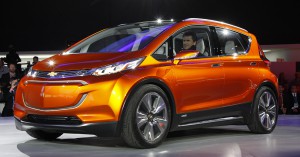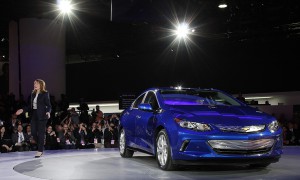
The Chevy Bolt will deliver significantly longer range than almost any current battery-electric vehicle - for around $30,000. Photo by Len Katz.
It may be a bit confusing, but Chevrolet will be sticking with the name “Bolt” when it launches its 200-mile battery-electric vehicle next year. Following the unexpected debut of the electric model, the maker had been debating whether to come up with an alternative less like the name of its current plug-in hybrid, the Chevrolet Bolt.
Despite sluggish sales of battery cars at a time when gas prices have plunged to lows not seen since before the Great Recession, the General Motors brand is convinced there’s a future for the technology, Chevy officials have stressed.
“Since unveiling the Bolt EV three months ago, the name has quickly become associated with Chevrolet,” the company said in a statement. “Therefore, we will use the name when the vehicle goes into production. The Bolt EV is a significant statement of Chevrolet’s commitment to electrification and the name suits this game-changing electric vehicle designed for attainability, not exclusivity.”
Following the Bolt’s debut at the Detroit Auto Show in January, GM North America President Alan Batey acknowledged the potential for confusing the two cars. Chevy insiders were particularly worried about that possibility in Hispanic communities because of the way the word, “Volt” is often pronounced by native Spanish speakers.
But at an even this week, marketing chief Tim Mahoney told USA Today, “The decision is made. The name won’t be changed.” If anything, he suggested the closeness of the names “can be an advantage,” and actually allow the new Bolt to build on the wide public familiarity with the older Chevy Volt.
Considering all the media coverage the Bolt has received over the past three months, company officials were reluctant to try to start all over again, insiders told TheDetroitBureau.com. They also noted that trying to find an alternative name that hasn’t already been registered by a competitor can be a major headache. That’s one reason more and more manufacturers have migrated to alphanumeric alternatives, like the ELR badge bolted onto the sibling Cadillac brand’s plug-in hybrid.
(Caddy cuts price, boosts performance of ELR. Click Here for the story.)
“We checked with customers and dealers and affirmed our belief that the name is a good fit and the association with Volt was seen as a positive,” said Chevy spokesman Mike Albano.
Chevrolet currently has two plug-based models in its line-up: the pure electric Spark EV and the Volt plug-in. The latter model is being completely updated for 2016, getting a new, longer-range drivetrain, among other changes. The battery-electric version of the Spark, meanwhile, will see a 6% price cut for 2016.
(For more on the 2016 Chevy Spark, Click Here.)
The Chevrolet Bolt is expected to deliver more than twice the range of the Spark, at an estimated 200 miles per charge. GM also plans to bring it in at under $30,000 – after factoring in the $7,500 federal tax credit.
That could help address two of what analysts call the biggest obstacles to wider public acceptance of electric propulsion: price and range.
Several other manufacturers are planning to push for longer range, including Nissan which has indicated the second-generation Leaf should approach 200 miles per charge. Tesla this month upgraded its base model, renaming it the Model S 70d and giving it an EPA-estimated 240 miles per charge.
(Click Here for our review of the new Tesla Model S 70d.)


The poor name choice could cause sales issues. if the marketing dept. can’t find a suitable name for the product, maybe they need new staff? I mean seriously, they can’t come up with a proper original name?
I have to agree, a poor marketing decision, unless they are going to get rid of the Volt sooner rather than later.